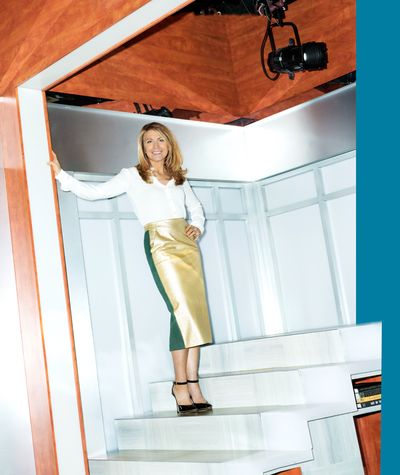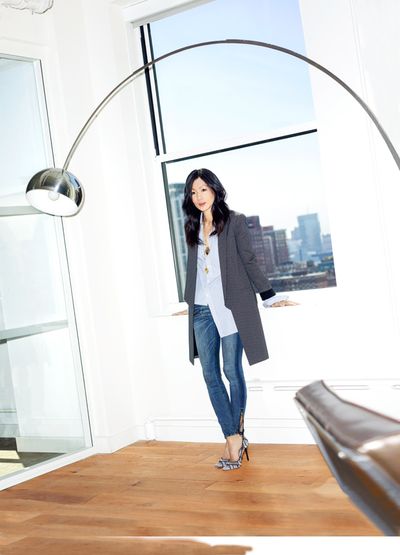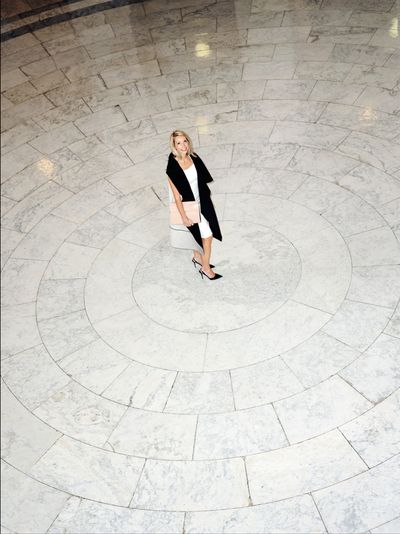Change Agents: 3 Women Who are OWNING their Future
What's the difference between a good leader and a transformational one? Vision, talent, and the guts to break with tradition. Meet three power players reinventing the rules in their respective businesses and proving that the future belongs to those who seize it.

(On Turness: Shirt, $895, Michael Kors; skirt, $595, Max Mara; shoes, $625, Emporio Armani)
"If I'd been told, 'NBC is exactly the way we want it, come in, keep driving it, I wouldn't have been interested."-Deborah Turness, President, NBC News
THE FIXER
It's a Friday morning in mid-June, and Deborah Turness, president of NBC News, is leading her daily 9 a.m. editorial meeting, which she calls The Exchange. About 40 news executives, producers, and correspondents from across the entire NBC News division, including the Today show and Nightly News with Brian Williams, are sitting shoulder to shoulder around a long conference table. (Another 50, including Andrea Mitchell, NBC's D.C.-based foreign affairs chief correspondent, are patched in via conference call.) Talk ping-pongs from Iraq to extreme weather across the heartland to the World Cup. Turness is enthusiastic and generous with praise—she's particularly fond of all-hands e-mails touting individual members of the team. Just before the meeting wraps, she presses the group about her "prizes"—exclusive interviews sure to generate buzz. Matt Zimmerman, vice president of booking for NBC News, tells her that he and Matt Lauer are this close to securing the first-ever TV interview with Pippa. Yes, that Pippa. She of the now-iconic butt-hugging bridesmaid dress, comely sister of the future Queen of England. Turness, who is British, visibly perks up. "Let me know if you need me to tip the balance," she says, smiling.
Turness, 47, has a lot to smile about these days. Just two years earlier, Today was in the throes of what media observers described as a tailspin. Ann Curry had been unceremoniously dumped as cohost, and viewers, stung by what they perceived as Lauer's involvement in the wincing affair, defected. After 16 straight years as the number one morning show in the country, Today was finally trumped by ABC's lighter, frothier Good Morning America. But in the year since Turness' arrival, not only has the hemorrhaging stopped, but Today is staging an improbable comeback. Though the show, with its 5 million viewers on average, according to recent Nielsen data, still trails GMA and its 5.7 million, it's chipping away at the gap, gaining 368,000 more viewers compared with last season. (The week the Pippa interview aired, the gap between ABC and NBC narrowed to just over 300,000 viewers.) Aside from Pippa Middleton, NBC News has nabbed some of the year's biggest gets, including Edward Snowden, Toronto Mayor Rob Ford, and disgraced ex-New York Congressman Anthony Weiner. The all-important media narrative is shifting back in NBC's favor.
Born and raised in Hertfordshire, an hour north of London, Turness spent 25 years at Britain's ITV News, first as a producer and then as an executive, where she cultivated a reputation as a dogged newshound. In 2000, she negotiated a deal with Monica Lewinsky for a series of reports on America called "Monica's Postcards"; in 2005, she secured exclusive photos of the four suicide bombers who killed 52 Londoners in an attack on the city's mass transit. She also demonstrated a deft touch for making her shows supremely watchable. Turness was one of the first producers to dispense with the traditional anchor desk in favor of a roaming or standing news anchor. That small tweak was soon mimicked by her competitors and even stateside, where the freestanding anchor is now a regular sight on cable and network news programs.
Turnesswas on maternity leave in London with her second child when she got the call last year from an NBC headhunter, who asked her to critique NBC News programs that she could stream online. ("On the whole, I find that American journalism is more polite than British journalism," she says. "British media is a little more direct and a little more abrasive when questioning people in positions of power. But you have to really, really screw up very publicly here for that level of heat to come your way.") In May 2013, she was offered the job. She moved to New York with her husband, John Toker, who served as the U.K.'s director of communications for counterterrorism—he was an adviser to the judicial council that investigated the notorious British tabloid phone-hacking scandal two years ago—and their two daughters, ages 10 months and 4. (He's now a stay-at-home dad.) "It was a really big job, and the thing is, it's about transformation, which I love," Turness says. "Look, if I'd been told, 'NBC is exactly the way we want it, it works, it purrs, it hums, come in, keep driving it,' I wouldn't have been interested. Bringing the organization through serious levels of change, driving content creation, and honing brands are all things I love."
Turness' first order of business was fixing the Today show. Though NBC Nightly News with Brian Williams draws nearly twice as many viewers, the Today show is NBC's golden ticket: In 2011, Today generated a staggering $485 million in ad revenue, making it far and away the most profitable program at NBC News. Rescuing it was critical to NBC's bottom line. Some of Turness' changes were cosmetic. She ditched the cool blue set for a warmer, orange one; producers added the Orange Room, a social media center hosted by Carson Daly, the ex-MTV VJ; outside, in the famous Today plaza, the metal and cement barricades, against which throngs leaned every morning, were draped with orange covers so as not to seem militaristic. Other changes have had a far more pronounced effect. Shortly after her arrival, Turness gathered her team to craft a mission statement, which she's committed to memory. The first line originally stated, "We are a news show, and so much more." But Turness, with the help of Lauer, deleted the second clause. "Matt and I just sat down and were like, We're really concerned about 'and so much more,' because it gives license to anyone who wants to say, 'You know what, it's OK we don't have so much news.' It's like, No, we are a news show, period."
Get exclusive access to fashion and beauty trends, hot-off-the-press celebrity news, and more.
Still, Turness is pragmatic about the changing attention spans and appetites of viewers. "I do feel that we can have a higher purpose, which is to bring important issues—global or domestic—to the audience's attention. But you've got to do it in a tone of voice and using tools that kind of sweeten the pill, that make it more engaging," she says. For a piece on Syrian refugee children, the Today show spotlighted a mother giving birth to twins, while the Nightly News focused on the family's tragic circumstances.
Other major changes at NBC News include consolidating the separate booking departments for all the news shows so they no longer cannibalize one another for guests. She also integrated the digital news division, which operated as its own fiefdom, publishing stories online without much regard to what was running on-air. And, perhaps most significant, Turness introduced NBC News to her signature brand of "event programming"—turning a one-off interview into a weeklong bonanza promoted across all of NBC's platforms. Case in point: The Middleton interview event began days before the piece actually aired, with Lauer's "surprise" on-air announcement. The hype only mounted when the New York Post's must-read Page Six gossip sheet reported that NBC considered offering Middleton a correspondent's role, which sparked a media and blogosphere blitzkrieg. Suddenly, everyone was talking about the Today show. "I like to event-ize things," says Turness, who also helms NBC News' regular "Shark Week Meetings," informally named after the Discovery Channel's ultra-popular weeklong series, where execs brainstorm themes that can be played out over a week on all of NBC News' programs. (Recent themed weeks have included "Love Your Selfie" and "Modern Dads.")
Though the battle to return Today to ratings primacy continues, Turness is also turning her attention to Meet the Press, once the Sunday pit stop of choice for Beltway insiders, now struggling in third place in the ratings. Though she's tinkering with the format—she broke up the show's long-standing tradition of a panel of guests opining on domestic and foreign policy and added a segment called "Meeting America"—the show is still flailing. But don't bet against Turness figuring out a winning formula just yet. "I'm running a very large business organization, but at heart, I am just a producer," she says. "And that isn't some managerial bullshit. When I went to Normandy a couple of weeks ago, I rolled up my sleeves and produced Tom Brokaw's lead story. That wasn't to show people I could still do it—it's because it's what I love to do." -by Yael Kohen

(On Webb: Shirt, $89.50, Banana Republic Men's; bananarepublic.com. Jacket, jeans, necklaces & shoes, Webb's own)
"I don't limit myself to the women's or men's side." -Marissa Webb, Creative Director and Executive Vice President of Design, Banana Republic
THE INNOVATOR
When Banana Republictapped New York–based designer Marissa Webb as its new creative director in April, fashion insiders dubbed the move "the beginning of a new era." They had good reason for the hyperbole. After all, installing the ultrachic Webb—who left her position as head of womenswear and accessories design at J.Crew in 2011 to launch her own eponymous label—to guide Banana Republic's overall creative direction was widely viewed as an audacious move to reposition the brand and its more than 700 stores as the go-to for stylish, affordable workwear in a marketplace crowded with competitors like Zara, H&M, and, ahem, J.Crew. Known for her edgy high-low sensibility (think fashion-forward tweed separates with moto and military detailing, and collared shirts with undone bow ties), Webb has been credited alongside former boss Jenna Lyons, the patron saint of mix-and-match, for modernizing the once stodgily preppy J.Crew.
Born in Seoul, South Korea, and adopted at age 4 along with her biological siblings, Webb was raised Jewish by her social worker father and piano teacher mother in Doylestown, Pennsylvania. ("I have a menorah, but I'm not really practicing," she says.) She studied fashion illustration and design at the Fashion Institute of Technology and quickly landed plum internships at Daryl K and Polo Jeans, where her quirky borrowed-from-the-boys style got her noticed by Ralph Lauren himself.
After graduating, she logged a stint at Polo Jeans and Club Monaco before finding her way to J.Crew, where she spent more than a decade rising through the ranks before striking out to launch her own label. "I was told the burnout rate for this industry was 10 years, so I figured I was ahead of the curve," she quips. Her line is now sold at more than 30 stores worldwide and online. Webb hasn't abandoned it for her new gig. In fact, Banana Republic's parent company, Gap Inc., became an investor.
As for what's ahead for Banana Republic, Webb hints at big changes. "It's everything from the clothes to the in-store experience to online styling," she says. "It's important that people see us as a lifestyle brand, not just a wear-to-work brand." She says she's been most inspired by the company's "travel DNA": "I went back to 1978 and how Banana Republic started, which was really about travel as inspiration. Utilitarian detailing can be very modern." Just don't expect the safari chic from the retailer's early days. "It's not right for our times to have a big giraffe in the middle of the store," she adds.
Also look for Webb's signature mixing of feminine and masculine to influence the retailer's offerings. Time to say buh-bye to traditional gender-segregated sections? "I don't limit myself to the women's or men's side," Webb explains. "I believe in showing people how to step out of their comfort zone. Maybe it's: How do you wear men's shirts? How do you make it feminine? We are a huge company, and we should be able to have something for everybody." -by Karen Schwartz

(On Hing: Cape, $2,990, Akris; dress, price upon request, Kiton; cuff, $945, Jennifer Fisher; shoes, $595, Jimmy Choo; clutch, $1,840, Marni)
"I'm part of the effort to make congress govern. i don't do drama. i do the bottom line." -Jennifer Hing, Communications Director, U.S. House Appropriations Committee
THE STRATEGIST
In this bitterly partisan era, Jennifer Hing's mission can only be described as Herculean. As communications director of the U.S. House Appropriations Committee—the influential congressional group that controls the government's roughly $1.1 trillion in discretionary spending—the 35-year-old Republican works behind the scenes to change the perception that Washington (and certainly her party) is thick with do-nothings and obstructionists. "It's my job to help people understand that not all of Congress is what they see on cable news or late-night TV," the Oregon native says. "I'm part of the effort to make Congress govern."
That lofty message isn't just image buffing. It's essential to her work as a liaison between officials in both parties and the media. "If Congress is continually seen as dysfunctional or petty, we can't advance our goals or enact legislation," she explains, citing the Omnibus Appropriations bill, which passed both chambers last winter and funded the entirety of the federal government. "It was a bipartisan, bicameral bill that had wide support. It was a true reflection of Republican and Democratic compromise."
One of six children and the first Hing to graduate college, Hing says she was raised with a "strong sense of Second Amendment rights." She earned a political science degree from Oregon State University, then set out for D.C. Aside from a short stint at the Department of Transportation during the George W. Bush presidency, she has worked in Congress ever since.
Her M.O.: Stick to the facts and avoid the kind of red-versus-blue rancor that has earned this congressional class an 80 percent disapproval rating, according to a recent Gallup poll. "I don't do drama," Hing says. "I do the bottom line."
So what of her fellow Republicans who balk at the kind of comity she favors, and even those on the intractable far, far right, like conservative Texas Senator Ted Cruz, who once called for the abolition of the IRS? "With the conservatives on our side, I step back and explain what we do. We're funding the roads, inspecting the meat," she says. "I'm confident there are still people in the middle who understand that the government should use tax dollars to invest in our country, but also use them responsibly." (Though she is careful not to name members of her party credited with the government shutdown last year, she concedes that within the GOP, "there is a general sense that that was not a good thing, though they may not fully admit it.")
Hing's earnestness—"I'm kind of a dork," she admits—is a refreshing, even urgent reminder that there are those in Washington dedicated to the kind of day-to-day, meat-and-potatoes work of governance taught in high school civics classes. "This committee has always been the moderate wing of both parties," she says. "I don't think I'd work anywhere else." -by Karen Schwartz
Dedicated to women of power, purpose, and style, Marie Claire is committed to celebrating the richness and scope of women's lives. Reaching millions of women every month, Marie Claire is an internationally recognized destination for celebrity news, fashion trends, beauty recommendations, and renowned investigative packages.